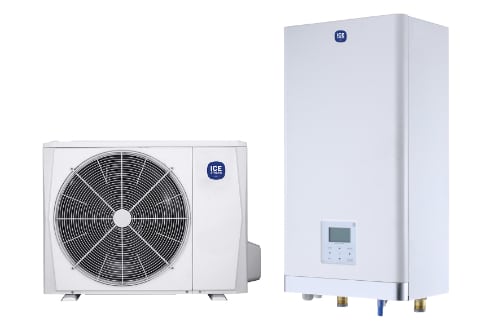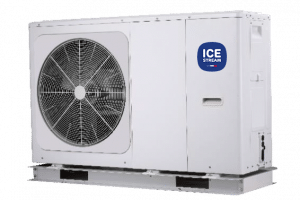AIR-WATER SPLIT SYSTEM HEAT PUMP
- Air-Water System: Ideal for replacing gas or oil boilers
- Water radiator, hot water, underfloor heating, air conditioning
- Compatible with 2 zones: floor and radiators
- Up to A+++ energy saving
- A++ at 55°C
- Inverter Technology
- Suitable for very low temperatures: -25°C
- Programmable
- WIFI option for remote programming
AIR-WATER MONOBLOC HEAT PUMP
- Air-Water System: Ideal for replacing gas or oil boilers
- All-in-one solution: easy to install
- Water radiator, hot water, underfloor heating, air conditioning
- Compatible with 2 zones: floor and radiators
- Up to A+++ energy saving
- A++ at 55°C
- Inverter Technology
- Suitable for very low temperatures: -25°C
- Programmable
- WIFI option for remote programming
Icestream presents its range dedicated to air-to-water heat pumps. We offer a range of products tailored to your heating, cooling, and hot water production needs.
Air-to-Water Heat Pump: What Is It?
An air-to-water heat pump, or air source heat pump, is a heating and cooling system that provides both heating, cooling, and hot water for your home. This device can be combined with a condensing gas boiler, resulting in a configuration called a hybrid heat pump.
Heat pump air/water: the Icestream range
Icestream offers a range of air-to-water heat pumps, including both split-system (comprising an indoor unit and an outdoor unit) and monobloc (outdoor unit only) models.
Our models come with a comprehensive set of features and performance capabilities to meet your heating, cooling, and hot water needs. Here’s an overview of the key characteristics of these products:
- Compatibility with various systems: Icestream heat pumps are compatible with heat emitters such as water radiators, underfloor heating systems, and domestic hot water production, allowing you to choose the system that best suits your home.
- Zone flexibility: Icestream heat pumps can supply up to 2 distinct zones, for example, connecting both underfloor heating and radiators in your setup.
- Extreme weather performance: Icestream heat pumps are designed to operate efficiently even in very low outdoor temperatures, down to -25°C, ensuring reliable heating even in harsh climates.
- Programming: Icestream heat pumps feature programming capabilities, allowing you to set operating schedules tailored to your daily routine for optimized thermal comfort management.
- Inverter technology: Icestream heat pumps use Inverter technology, automatically adjusting the equipment’s power based on heating needs, providing optimal energy performance and consistent comfort.
- WiFi option: Some Icestream heat pumps come with a WiFi option, enabling remote control of your heating system via your smartphone or tablet, offering increased flexibility and ease of use.
- Energy savings: Icestream heat pumps enable significant energy savings, with energy ratings up to A+++, helping reduce heating bills while minimizing environmental impact.
- Excellent thermal performance: Thanks to their advanced design, Icestream heat pumps deliver excellent thermal performance, allowing you to enjoy optimal comfort in your home, regardless of the existing heating system.
Icestream split-system air-to-water heat pumps are versatile, efficient, and provide a comprehensive heating solution for your home. With their numerous features and high performance, they are suitable for various heating installations, allowing you to enjoy optimal thermal comfort while reducing energy consumption.
What are the advantages of an air-water heat pump?
Opting for an air-to-water heat pump offers numerous considerable advantages. Here are the main reasons why this heating system is increasingly popular:
Savings on your bills
With an air-to-water heat pump, you can achieve significant savings per year on your heating bills. This system harnesses the heat present in the outdoor air, a renewable and free energy source. By using this heat to warm your home, you greatly reduce your dependence on fossil fuels and constantly rising tariffs.
Eligibility for financial aid
By choosing an air-to-water heat pump, you can benefit from attractive financial assistance that significantly reduces your initial investment. Depending on your place of residence, you may be eligible for government subsidies, tax credits, low-interest loans, or even energy-saving certificates. These aids help you quickly recoup your initial investment.
Excellent efficiency
The air-to-water heat pump offers high energy efficiency, meaning it produces more energy than it consumes. Depending on the models, the efficiency can reach a coefficient of performance (COP) of 3 to 5, meaning it produces between 3 to 5 times more heat than it consumes in electricity. This translates to remarkable energy efficiency and substantial savings on your energy consumption.
Extended lifespan
An air-to-water heat pump has an average lifespan of 17 years or more. By choosing this heating system, you are investing in a durable solution that will accompany you for many years. The high-quality components and reliability of Icestream heat pumps ensure optimal performance in the long term, allowing you to fully recoup your initial investment.
Simple installation
The installation of an air-to-water heat pump is relatively straightforward. The outdoor and indoor units can be easily installed in your home, whether it’s a new construction or a renovation. Additionally, the adaptability of the system allows it to be installed in various configurations and fully utilized, even in restricted spaces.
Environmentally friendly
By using the heat present in the outdoor air as an energy source, the air-to-water heat pump helps reduce greenhouse gas emissions. By opting for this more eco-friendly heating system, you are acting in favor of the environment by limiting your carbon footprint. Additionally, some heat pump models use environmentally friendly refrigerants, contributing to better environmental preservation.
How does an air-water heat pump work?
A heat pump air-to-water operates on a simple yet effective process to provide you with warmth, cooling, and hot water:
Firstly, an outdoor unit of the heat pump captures heat calories from the outdoor air. Even in cold weather, there are thermal calories in the ambient air.
Next, these calories are transported using a refrigerant fluid, acting as a thermal vehicle, to the indoor unit of the heat pump. There, the refrigerant fluid is compressed, significantly increasing its temperature. Upon condensing, it releases the stored heat.
This generated heat is then distributed throughout your home. It is directed to your heating emitters such as radiators or underfloor heating, effectively heating your interior. Additionally, it is also used to produce hot water for your domestic needs, such as showers and taps.
Thus, through this process, the air-to-water heat pump allows you to benefit from a renewable and free heat source by harnessing calories from the outdoor air to heat your home and produce hot water. This translates to substantial energy savings and a reduced carbon footprint.
How much does an air-to-water heat pump consume?
When assessing the consumption of an air-to-water heat pump, several factors need consideration. The power of the equipment is one of these elements as it directly influences energy consumption. Additionally, it is important to consider the coefficient of performance (COP) of the heat pump, which measures its efficiency in terms of energy production compared to energy consumed.
To estimate the electricity consumption of your air-to-water heat pump, you can use the following formula:
Electricity consumption in kilowatt-hours (kWh) = Heating capacity / COP x hours of heating per year
However, it is important to note that this formula provides a general estimation and other factors can influence the actual consumption of your heat pump:
- Building insulation: Well-insulated buildings reduce heat losses, which can result in lower heat pump consumption
- Heating habits: Your temperature preferences and usage of the heat pump will impact the amount of energy consumed.
- Weather conditions: Outdoor temperatures influence the heat pump’s performance. In colder weather, energy consumption may increase as more heat needs to be extracted from the outdoor air.
It is recommended to consult with a qualified professional to accurately assess the estimated consumption of your air-to-water heat pump based on your specific situation. They can consider all relevant factors and provide a more precise estimation.
In general, opting for an air-to-water heat pump allows for significant energy savings compared to other traditional heating systems, resulting in lower heating bills and a reduced environmental footprint.
How much does an air-water heat pump cost?
The cost of an air-to-water heat pump can vary depending on several factors, such as the type of device, its power, and the chosen brand. On the market, the average prices of air-to-water heat pumps typically range between €10,000 and €16,000.
When evaluating the cost of an air-to-water heat pump, it’s important to consider the size of your home. According to the Ademe (French Agency for Ecological Transition), a budget of €65 to €90 per square meter heated is recommended. This is because the larger your house is and the more rooms it has to heat, the more powerful your heat pump needs to be to meet the thermal demand of your entire home. Consequently, the price of the heat pump will increase accordingly.
It’s also important to take into account other elements when calculating the overall cost of your air-to-water heat pump installation. This may include labor costs for installation, any necessary modifications to the existing heating system, connection fees, etc.
How to maintain an air-to-water heat pump?
To ensure a prolonged lifespan and optimal performance of your air-to-water heat pump, regular maintenance is essential. It’s recommended to have a professional perform this maintenance once a year. However, there are also some maintenance tasks you can do yourself to keep your equipment in good condition.
Here are some tips for maintaining your air-to-water heat pump:
- Cleaning the outdoor unit: Regularly check that the outdoor unit of your heat pump is free from debris, leaves, branches, or other obstructions. Gently clean the unit using a cloth or soft brush to remove accumulated dirt.
- Dusting the indoor units: It’s important to dust the indoor units, such as radiators or underfloor heating, to prevent the accumulation of dust that could hinder heat distribution. Use a vacuum cleaner or clean cloth to remove dust and particles.
However, certain specific maintenance tasks should be entrusted to a qualified professional. Only an expert will be able to perform essential checks to ensure the proper functioning of your heat pump:
- Leakage check: A professional will check the tightness of your installation to ensure there are no refrigerant leaks.
- Refrigerant inspection: The technician will check the level and quality of the refrigerant, make necessary adjustments, and ensure that the refrigeration circuit is working correctly.
- Functionality check: A thorough check will be performed to ensure that all components of the heat pump are working correctly and that the entire system is in good condition.
By entrusting the annual maintenance of your air-to-water heat pump to a professional, you ensure that all necessary operations are carried out properly. This not only guarantees the performance and durability of your equipment but also provides peace of mind regarding its proper functioning.
You can also browse our range of accessories for heat pumps.



